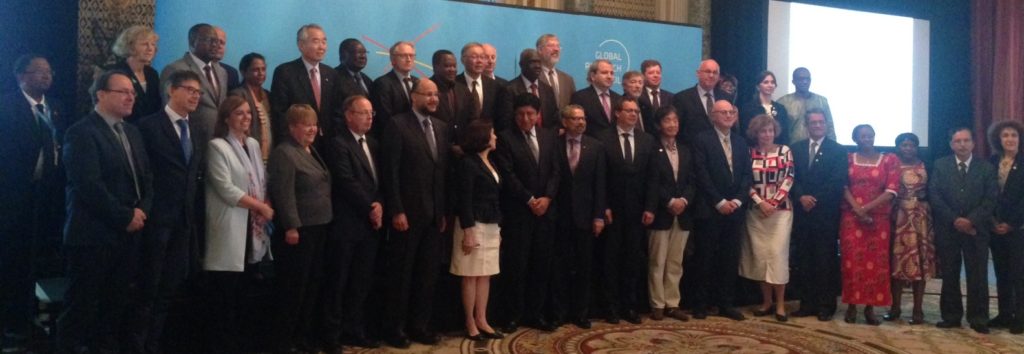Canada to lead council of global research funders
Canada’s renewed efforts to raise its profile on the global stage were bolstered last week with news that Dr. Mario Pinto will take over as chair of the Global Research Council (GRC), a federation comprising the heads of 70 science and engineering funding councils from 50 countries. The Natural Sciences and Engineering Research Council (NSERC) president replaces Dr. Yuichiro Anzai, president of the Japan Society for the Promotion of Science, who now becomes vice-chair. As GRC chair, Pinto will represent the interests of Canada’s major research granting agencies.
 Participating members from 70 research granting agencies from around the world attended the annual GRC meeting in Ottawa, May 29-31, 2017. NSERC president Dr. Mario Pinto was selected to serve as its next chair.
Participating members from 70 research granting agencies from around the world attended the annual GRC meeting in Ottawa, May 29-31, 2017. NSERC president Dr. Mario Pinto was selected to serve as its next chair.
Pinto’s leadership comes at an opportune time for Canada. Prime minister Justin Trudeau has been criss-crossing the globe since his election extolling the benefits of investing in and partnering with Canada, including in the field of science. In early May, Pinto was part of a delegation led by Science minister Kirsty Duncan that met with top US science officials to discuss opportunities for increased cross-border collaboration.
Pinto said Canada’s leadership of the GRC will make it easier to strengthen international linkages and form new partnerships.
“Having me chair the governing board signals that there’s trust from the other partner countries, and at a time when the Canadian brand for science and evidence-informed decision making is really strong internationally,” Pinto told RESEARCH MONEY at the annual GRC gathering, held this year in Ottawa. The meeting was co-organized by NSERC and Peru's National Council for Science, Technology and Technological Innovation (Concytec), in partnership with Canada’s International Development Research Centre.
Formed in 2012, GRC’s members represent more than $1.7 trillion or 80% of all public research spending globally. Its mission is to promote the sharing of data and best practices for high-quality collaboration among funding agencies worldwide. The group endorsed two major priorities for the next year: capacity building and connectivity among granting agencies worldwide, as well as the interplay between fundamental research and innovation.
As for the latter, Pinto urged delegates not to obsess on the differences between basic and applied research, describing them as “artificial boundaries”. Instead, he recommended focusing on excellent research and ensuring there are receptors for this research. Also, with more governments demanding the biggest possible return from every public dollar spent, measuring societal and economic impact has become critical.
“Here in Canada, you see minister (Navdeep) Bains and others trying to develop an ecosystem of RD&D — research, development and delivery,” says Pinto. “So instead of setting up this natural tension between fundamental and applied research, you present it as an ecosystem to governments so they can see how you have a natural flow between the three activities and continuous optimization. Think of it as a feedback loop.”
On the issue of capacity building, the GRC has taken a strong stand on the need for greater diversity and gender equality in research across all countries, as well as within the GRC itself which has just one woman on its governing board.
“Ireland is way ahead of other countries in measuring impact and way ahead in terms of gender equity practices,” says Pinto. “They were able to share with us what they are doing.” For example, Ireland’s three major research funding agencies recently made gender equality accreditation in higher education institutions a condition of funding by the end of 2019.
GRC is also sharing best practices to help countries build capacity to conduct peer-review at a level that stands up to international scrutiny. “That’s very fundamental because if countries don’t have capacity within universities, let alone granting agencies to do peer review at a level that is as respected as other countries then international collaboration is not that possible,” says Jean Saint-Vil, associate VP of the Networks of Centres of Excellence and a delegate at the GRC meeting.
At the same time, the GRC wants to see developing countries have a stronger voice at the table. This year attracted the largest delegations yet from South American and sub-Saharan Africa countries, yet several poorer countries still lack the capacity to fully participate in research collaborations.
That’s both a challenge and a responsibility for countries like Canada, says Pinto. The recently released report of the Advisory Panel on Federal Support for Fundamental Science recommends building more research collaborations between Canada and other countries.
“But how do you do that with developing countries that may not have the capacity or funding to collaborate with richer nations,” says Pinto. “One way is by sharing best practices so these countries can examine critically what works and what doesn’t work and develop their own policies that are congruent.”
Saint-Vil said the GRC can help these countries by better coordinating international consensus on issues like open access and peer review.
“And this applies to Canada as well,” he says. “In the last few years China overtook the UK as our second biggest international research partner and they will likely pass the U0. soon. That means you need to readjust how you consider who your partners might be. And for those collaborations to be fruitful, you need to have agreement on certain basic principles.”
Next year’s annual GRC meeting will be held in Moscow, Russia.
R$
| Organizations: | |
| People: |
Events For Leaders in
Science, Tech, Innovation, and Policy
Discuss and learn from those in the know at our virtual and in-person events.
See Upcoming Events
You have 0 free articles remaining.
Don't miss out - start your free trial today.
Start your FREE trial Already a member? Log in
By using this website, you agree to our use of cookies. We use cookies to provide you with a great experience and to help our website run effectively in accordance with our Privacy Policy and Terms of Service.





